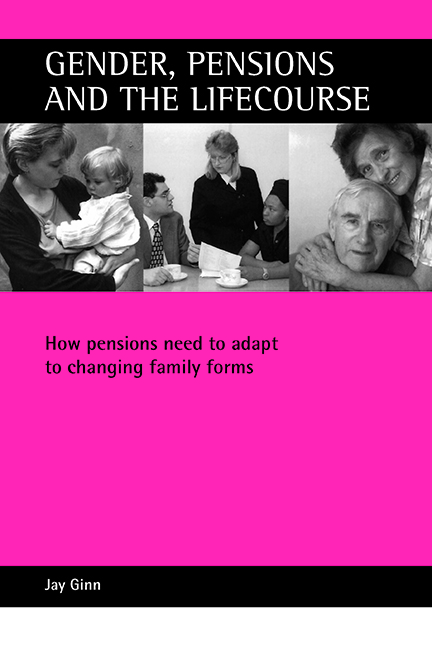Book contents
- Frontmatter
- Contents
- List of tables and figures
- Acknowledgements
- one Trends in gender relations, employment and pensions
- two Choice and risk in pensions: gender and class inequalities
- three Pension prospects for minority ethnic groups
- four Changing patterns of partnership: divorce and pensions
- five Impact of motherhood on pension acquisition: differentiation according to education
- six Gender and pensions in the European Union: towards an independence model?
- seven British pension policy: a gender perspective on alternative rescue plans
- References
- Appendix Statistical tables
- Index
one - Trends in gender relations, employment and pensions
Published online by Cambridge University Press: 20 January 2022
- Frontmatter
- Contents
- List of tables and figures
- Acknowledgements
- one Trends in gender relations, employment and pensions
- two Choice and risk in pensions: gender and class inequalities
- three Pension prospects for minority ethnic groups
- four Changing patterns of partnership: divorce and pensions
- five Impact of motherhood on pension acquisition: differentiation according to education
- six Gender and pensions in the European Union: towards an independence model?
- seven British pension policy: a gender perspective on alternative rescue plans
- References
- Appendix Statistical tables
- Index
Summary
As the main source of income in later life, pensions can make the difference between a daily struggle and a period of fulfilment, between merely surviving and actively thriving. At the start of the twenty-first century, life in retirement has lengthened, with people living an average of over 20 years beyond the state pension age. With longer lives, an adequate pension income is more necessary than ever before. Women’s savings have to last longer than men’s, as they can currently expect to live another 22 years after age 60 compared with 18 for men (OECD, 2001a).
There is a widespread sense of crisis and uncertainty over the future of pensions in Britain. While state pensions are apparently in terminal decline due to the policy of successive governments, the risks of reliance on the private sector of pensions are increasingly evident. Plummeting projections for investment returns and a question mark over the continuation of final salary occupational pension schemes follow a saga of mis-selling in personal pensions. Expressing widespread concern, one financial expert concludes that “The much-trumpeted UK model of private pensions funding looks distressingly shaky” (Plender, 2003, p 1). As a result, many people banking on their private pensions are threatened with an impoverished old age, or a much lower income than they expected. Both the government and the private pensions industry urge people to save even more in private pension schemes, to make up the shortfall. However, the ability to do this is gendered, depending on employment and earnings, and also varies with stage in the lifecourse.
Far-reaching social changes have transformed gender relationships and norms as to partnering and parenting. Major changes include growing expectations of women’s equality and financial independence irrespective of marital status; the sexual revolution, giving women greater control over their fertility; and increasing recognition of the importance of women’s skills in the workplace and the economy as a whole. At the same time, the expectation of lifelong marriage has declined, with increases in divorce, cohabitation and lone parenthood as all these have become more socially acceptable. These changes offer both opportunities and challenges to individuals and society and have profound implications for women’s acquisition of pensions. Yet successive generations encounter (and contribute to) these changes at different stages in their lifecourse, with consequently different effects on their future options.
- Type
- Chapter
- Information
- Gender, Pensions and the LifecourseHow Pensions Need to Adapt to Changing Family Forms, pp. 1 - 20Publisher: Bristol University PressPrint publication year: 2003



